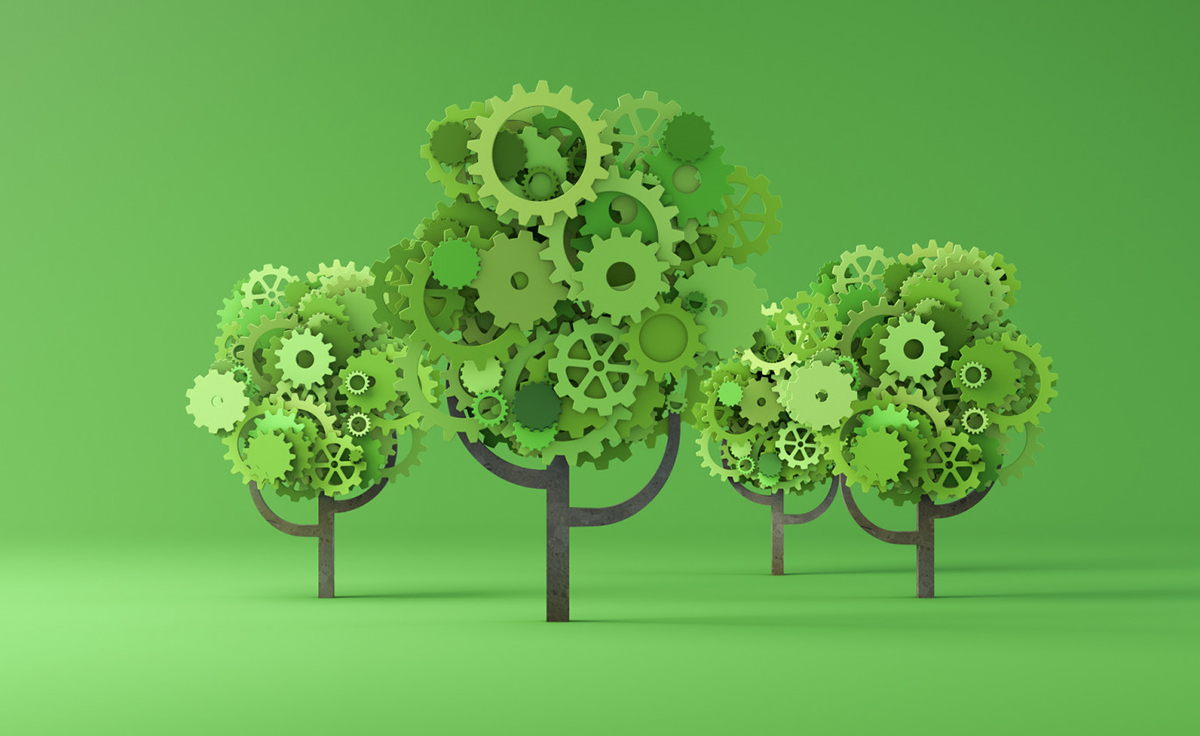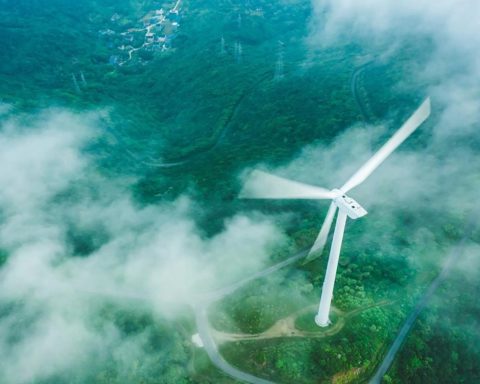Connaissez-vous cette petite histoire Soufi ? Il fait nuit ; un homme est là, à quatre pattes sous un réverbère inspectant scrupuleusement chaque pouce de terrain. Un passant vient lui prêter main forte.
– Hé ! L’ami puis-je vous aider? Vous avez perdu quelque chose ?
– Oui ! Mes clés !
Et voilà nos deux compères affairés à chercher. Au bout d’une dizaine de minutes, en dépit de tous leurs efforts les clés restent introuvables.
– Il y a là quelque chose d’étrange, dit l’homme qui était venu en renfort. Vous êtes certain que c’est là que vous les avez perdues ?
– Oh non ! Répond l’autre ; ce n’est pas ici mais là au moins on voit clair !
Absurde, n’est-ce pas ? Pourtant, le croirez-vous, notre humanité cherche les solutions au défi humanitaire et écologique dont dépend sa survie à la lumière du mode de pensée qui a généré ses problèmes.
Une prison idéologique
L’écologie est considérée à la seule condition que de nouveaux marchés rentables en découlent.
Qui pourrait nier que nous sommes face à une urgence écologique et humanitaire ? Qui pourrait nier qu’en dehors de quelques mesures cosmétiques rien n’est fait ? Pourtant depuis 1973 les limites d’une économie fondée sur la croissance sont connues (rapport Meadows). Pourtant, depuis 1992, sommet de la Terre à Rio, la question environnementale et la nécessité d’épouser un modèle de société durable sont mis à l’agenda des priorités. Mais en dépit des engagements (purement verbaux) pris au fil des sommets et conférences internationales, on ne peut que constater un immobilisme suicidaire.
À quoi est-il dû ? À la croyance idéologique que le modèle économique dominant, le capitalisme financier, peut répondre au défi. Einstein ne nous rappelle-t-il pas qu’un problème ne peut être résolu par le mode de pensée qui l’a causé ? La pensée des élites politiques, économiques et financières, exclue donc la remise en cause du modèle en vigueur. Elle cherche les solutions à l’intérieur du cadre. Cela conduit à imaginer qu’il suffit de « verdir » l’économie en favorisant des solutions telles que la voiture électrique, l’éolien ou encore le photovoltaïque… Pourquoi ? Parce que ces pistes créent de nouveaux marchés juteux.
Mais qu’en est-il par exemple du respect de la biodiversité, de la régénération des sols, de la protection des ressources en eau potable? Là, on botte en touche car ce serait remettre en cause le modèle de l’agro-business auxquels sont liés tant d’intérêts directs et indirects. Seul le Bio intensif, faux nez d’une agriculture paysanne, se confectionne un nid dans le paysage parce que les marges à la distribution sont grasses et parce qu’il permet de se créer une belle image « responsable ». Dans notre société dite de communication, seules les apparences comptent.
L’écologie est donc considérée à la seule condition que de nouveaux marchés financièrement profitables en découlent, mais elle se heurte à une montagne de freins, d’impossibilités ou de dénigrements si elle entraîne des dépenses ou si elle risque de fragiliser les intérêts dominants (l’interdiction d’utilisation du glyphosate par exemple qui n’en finit pas d’être repoussée). Imaginez une seconde que l’électrification du parc automobile soit assortie d’un objectif de réduction à 50% de ce parc d’ici dix ans. Car on oublie un peu vite que la question écologique doit aussi résoudre celle de la raréfaction des ressources non renouvelables ! Nul doute qu’alors ce deuxième volet ne serait pas aussi populaire que le premier ! Qu’en serait-il d’ailleurs pour vous si une mesure environnementale condamnait votre emploi ? Vous applaudiriez ou vous vous battriez pour sauver votre chèque de fin de mois?
Une représentation de la richesse inversée
Un autre point est rarement évoqué : notre modèle économique ne considère comme RICHESSE que ce qui est rentable financièrement. Ce qui ne l’est pas est une DÉPENSE et ne peut donc avoir valeur de richesse dans notre pensée. Et c’est bien là le drame. Car il semble bien qu’on en soit arrivé à un moment de notre histoire où ce qui génère du profit financier est de plus en plus nuisible au regard des conditions de travail, de la santé et de l’environnement, alors que ce qui serait indispensable à la préservation de la vie et un mieux-être de tous n’a pas vocation par nature à être rentable financièrement.
Cette situation nous maintient dans un simple « green washing » qui, faute de résoudre les problèmes, se contente de donner bonne conscience en entretenant l’illusion qu’on est sur la bonne voie. L’humain n’aime pas le changement, on le sait ; la tendance naturelle est donc de se persuader que pour aller vers des lendemains qui chantent on peut conserver le même mode de vie en modifiant simplement les moyens qui posent problème.
L’avenir de l’humanité dépend de sa capacité à passer d’un mode de vie régulé par l’argent à un mode de vie régulé par ce que la planète peut soutenir sans en souffrir.
Le défi consiste donc à assurer une suffisance digne aux milliards de terriens en rendant globalement compatibles la production et la consommation avec ce dont la planète a elle-même besoin pour soutenir la vie. Cela implique de passer d’une économie linéaire – Produire, transformer, distribuer, consommer, jeter, à une économie circulaire – Produire, transformer, distribuer, consommer, recycler et/ou réutiliser pour une autre production et/ou réparer, régénérer, basée essentiellement sur les ressources renouvelables exploitées de façon responsable.
Un défi d’ajustement considérable, donc, que les mesures et orientations actuelles ne permettent ni n’envisagent réellement, comme si le seul problème se résumait à l’émission du CO2 dans l’atmosphère. Pire encore on peut penser qu’elles peuvent au contraire aggraver les choses, car elles obéissent avant tout à des critères comptables et non à une réelle pertinence socio-environnementale. Compte tenu de ce que je viens de dire on pourrait en conclure que cet ajustement est impossible à réaliser, ce que notre réalité quotidienne tend à démontrer. Pourtant…
La clé du changement
Lorsque la monnaie était matérielle et donc limitée en quantité par nature, nos ancêtres étaient enfermés dans une logique de gâteau à partager ; l’intérêt collectif ne pouvait être servi que par prélèvement d’une part des revenus de chacun pour constituer une cagnotte destinée à son financement. C’est l’importance de cette cagnotte qui conditionnait ce qu’il était possible de faire. Mais la monnaie n’est plus matérielle. Elle est devenue une unité de compte virtuelle, créée par la seule volonté humaine. La quantité de monnaie est maintenant élastique. Notre réalité est la suivante, ou plutôt pourrait être la suivante si on le voulait vraiment :
Si une collectivité a un besoin collectivement souhaitable, la volonté de le satisfaire, les moyens techniques et énergétiques, une main d’œuvre disponible et le savoir-faire, une empreinte écologique neutre, alors rien ne s’oppose à sa réalisation et certainement pas l’argent qu’il est possible de créer à la hauteur nécessaire. On pourrait donc relever le défi car ce ne sont ni les pistes de solutions ni les ressources humaines qui manquent. Il suffirait de remplacer la limite qu’impose l’accès à la monnaie artificiellement raréfiée et orientée par la limite de ce que la planète peut soutenir.
La clé n’est pas sous le réverbère
Mais tel n’est pas le cas. Alors que rien ne le justifie (en dehors de l’avidité) on reste dans la logique du gâteau à partager comme à l’époque où la monnaie était matérielle. Les QE (quantitative easing – en français, assouplissement monétaire) pratiqués depuis dix ans par les banques centrales par milliers de milliards, ont permis à l’opinion publique de comprendre que la question est moins dans la limitation de la monnaie que dans son affectation. Le mouvement « QE for people » qui propose une création monétaire destinée à améliorer le pouvoir d’achat des citoyens en est une expression parmi d’autres. De même, de plus en plus d’économistes invitent à utiliser le pouvoir de création monétaire pour financer la transition écologique.
Mais…
– Ils ne changent rien aux règles actuelles de création monétaire qui s’appuie sur une dette équivalente. Ce sont majoritairement les banques privées qui créent la monnaie chaque fois qu’elles accordent un crédit à une personne, une entreprise, une collectivité, une Nation… Et même si le financement de la transition était confié à une banque publique, comme c’est souvent suggéré, on resterait dans la logique de monnaie de crédit, fût-il à taux zéro.
– Plusieurs études chiffrent les besoins financiers pour parvenir à un modèle soutenable au niveau mondial à une somme située entre cinquante et cent mille milliards de dollars, soit grosso modo le PIB de l’ensemble des pays du globe. Quand on sait que l’humanité crève déjà de ses dettes privées et publiques, est-ce bien réaliste ?
– Il faudrait une entente internationale car si un seul État ou une seule région monétaire s’engageait dans cette voie, le poids de sa dette et la masse de monnaie mise en circulation conduiraient à une dévaluation importante de sa monnaie et fragiliseraient considérablement son économie. Dans un monde où les inégalités sont abyssales et où la compétition est une valeur supérieure, un accord mondial est-il envisageable à court ou moyen terme comme l’urgence de la situation l’exige ?
– Dans le meilleur des cas, sans modification profonde du système, on continuerait à ne considérer que les pistes génératrices de profits financiers. La quête du profit et/ou la recherche d’équilibre budgétaire au mieux, s’imposeraient à la pertinence des actions. Sent-on au sein des « élites » l’envie de remettre le modèle actuel en question ? Cela viendra sans doute sous la pression des peuples mais faute de volonté politique, cela demandera du temps.
La clé est juste en dehors de l’éclairage
Comment donc faire sauter rapidement le verrou des impossibilités ? En ne s’opposant pas au système en place pour que l’énergie et l’intelligence déployées ne se diluent pas dans une lutte épuisante et sans doute vouée à l’échec dans la mesure où l’opposition renforcerait diamétralement la résistance. Pour cela, il « suffirait » de créer un nouveau champ économique dédié à la transition, élargi à tout ce qui concerne le Bien commun, complémentaire au champ de l’économie marchande, qui ne soit plus dépendant ni de l’impôt, ni de l’emprunt ni des performances de l’économie marchande.
Cela est rendu possible grâce au fait que la monnaie se crée à volonté, à condition qu’elle ne soit pas balisée par une dette mais par la reconnaissance de la vraie richesse. Exemple : On veut assainir un cours d’eau. Dans la logique actuelle on se tourne vers les pouvoirs publics à qui on demande de financer le chantier (ou pas) selon que leur budget, alimenté par la fiscalité, le permet (ou pas). C’est l’accès à l’argent qui détermine ce que l’on peut faire ou non. Et comme les cordons de la bourse sont serrés par le fait que les ressources sont limitées par ce que l’impôt permet, (un impôt auquel chacun cherche à échapper le plus possible, les plus riches en premier), on en est réduits à arbitrer les priorités.
Dans ce nouvel espace au contraire, la question de l’accès à l’argent ne se pose plus, car une fois l’accord sur l’action à entreprendre trouvé, un organisme public d’émission monétaire crée une monnaie complémentaire, sans dette, au niveau requis. La question qui se pose en revanche, c’est la pertinence du projet et celle des moyens utilisés au regard de l’objectif global d’adaptation de notre mode de vie à ce qui est nécessaire pour soutenir la vie. Dans notre exemple, la richesse est une eau saine et non un résultat financier. Dès lors qu’on s’affranchit de la logique comptable qui condamne à mettre sous la pile toute expression de richesse réelle si elle se traduit par une dépense, c’est la chose qui compte et non le prix de la chose. Tout devient alors possible. Il n’est plus question de gain ou de perte, il n’est question que de bénéfice sociétal, autrement dit ce qu’on estime essentiel à la préservation et à l’épanouissement de la vie sous toutes ses formes.
Réconcilier intérêt privé et intérêt collectif
Si on veut vraiment créer les bases d’un monde durable et équitable, il n’y a pas d’autre moyen que de libérer le potentiel de l’intelligence humaine de la prison comptable qui l’enferme et le conditionne. Mais il ne suffit pas de le dire pour le faire. Le nouvel espace que je viens de décrire fonctionne sur une logique qui est aux antipodes de celle qui régit nos sociétés actuellement. On ne peut pas d’un claquement de doigts remplacer un système par un autre. En revanche, défricher et planter un nouveau champ en complément de l’existant ouvre de vastes horizons.
L’humanité a exploré deux voies : Le collectivisme qui, au nom de l’intérêt collectif, a broyé l’individu et le capitalisme qui, au nom de l’intérêt privé, tue son espace vital. Dans l’un et l’autre cas le Bien commun et l’intérêt privé se contrarient. Ce constat n’invite-il pas à explorer une nouvelle voie, celle ou l’intérêt particulier et l’intérêt collectif sont réconciliés par le fait de les mettre en complémentarité ?
Tant que le collectif restera financé par la fiscalité, par conséquent en totale dépendance des performances de l’économie privée et de ce qu’elle consent à lui reverser, il ne pourra pas être traité à la hauteur du défi actuel. C’est cela que permet l’ouverture de ce nouveau champ économique. D’un côté l’intérêt privé est servi par l’économie marchande, financé par les devises internationales sur le mode actuel et de l’autre, le Bien commun est traité et financé de façon autonome par une monnaie complémentaire dont le collatéral n’est pas une dette mais la réalisation des projets choisis démocratiquement. Chaque espace soutient l’autre au lieu de s’y opposer.
Deux monnaies, est-ce réaliste ?
Les économistes vous diront qu’un système où circulent deux monnaies ne fonctionne pas car la loi de Gresham affirme que « la mauvaise monnaie chasse la bonne ». Sans doute est-ce vrai lorsque les monnaies sont en compétition, mais ici on est dans un contexte inédit où elles sont en complémentarité. Certaines conditions sont toutefois à respecter :
- La monnaie complémentaire de Bien commun a cours légal afin que quiconque sur le territoire ait obligation de l’accepter en paiement.
- Elle est créée au fur et à mesure de l’adoption et de la mise en œuvre des projets à la hauteur requise par un organismes d’émission monétaire public sous mandat et contrôle citoyen.
- Elle n’a cours qu’à l’intérieur du territoire national. Par exemple, l’Europe continue d’avoir comme devise marchande commune l’euro, le Canada le dollar canadien, mais chaque pays, chaque province a sa propre monnaie complémentaire lui permettant de conduire librement sa politique éco-sociale.
- Elle n’est pas convertible (sauf exception de façon limitée en période transitoire) ; elle n’a donc pas d’effet sur le cours de la monnaie marchande.
- Elle est à parité de pouvoir d’achat avec la monnaie marchande : Une unité de monnaie complémentaire = une unité de la monnaie marchande.
- Pour ne pas affecter le commerce extérieur et pour relever le défi écologique, elle est fléchée vers des biens et services produits de façon écologiquement et socialement responsable sur le territoire. Cela peut être perçu comme un handicap discriminatoire au départ mais c’est essentiel si on veut que cet espace accomplisse sa mission sans oublier que cela favorisera la relocalisation de certaines productions abandonnées, dans des conditions sociales et environnementales satisfaisantes.
- Cette monnaie se retrouve en circulation sur le territoire national par le paiement des rémunérations versées aux acteurs engagés dans cet espace. Elle circule librement dans tous les commerces qui n’auront qu’à organiser le fléchage pour faciliter le repérage de ce qui est accessible aux porteurs de cette monnaie. Tous les paiements peuvent donc se faire dans les deux monnaies comme à l’époque où les anciennes monnaies nationales et l’euro circulaient ensemble.
- Les règlements se font au prorata des recettes dans chaque monnaie.
- Elle donne lieu à une longue période de débat public pour en rendre les avantages perceptibles par tous. Elle doit être adoptée (ou refusée ?) par referendum populaire et, si acceptée, mise en service progressivement sur une base de volontariat au départ.
- Elle est soumise à une fiscalité spécifique dont le but n’est plus de constituer une recette à redistribuer, mais à détruire la monnaie pour éviter l’inflation.
Au cas où vous ne percevriez-pas encore tous les avantages d’une telle orientation en voici les principaux.
Les avantages :
- Contrairement au fait qu’en règle générale la mise en œuvre d’une réforme, même globalement positive, contrarie toujours certains intérêts, ici tout le monde gagne. Le changement ne se fait au détriment de personne. Il n’y a pas de déclaration de guerre ; il y a plantation d’un arbre qui, tout en offrant des fruits pour l’urgence, garantit un avenir de mieux-être pour tous au fil de sa croissance.
- La décision de la mise en œuvre de cette mesure dépend de la Nation seule. On fait donc l’économie d’une interminable renégociation des traités et accords internationaux qui n’aurait d’ailleurs aucune chance d’aboutir. Il va toutefois sans dire que cela demande une volonté politique forte de la part du gouvernement qui adoptera en premier ce principe, car nul doute que ce sera considéré comme un coup de canif inadmissible dans les règles du jeu. Mais il ne s’agit pas de « tricher » pour en tirer un quelconque avantage compétitif. Il s’agit d’ouvrir une voie pour un mieux-être pour tous. Les peuples ne sont pas idiots; ils auront tôt fait de voir la solution que représente pour eux-mêmes l’application d’une telle mesure et ils forceront leurs dirigeants à aller dans le même sens.
- La question récurrente de l’emploi trouve enfin sa solution car ce nouvel espace économique offre potentiellement, non plus un emploi, mais une activité utile, rémunératrice et épanouissante à toutes celles et ceux qui ne se sentent plus à leur place dans le système actuel ou qui en sont exclus ou mis en marge. En effet, dès lors que le financement du Bien commun n’est plus prélevé sur les profits et revenus des uns et des autres, il n’est plus considéré comme une dépense mais reconnu comme une richesse. Le champ des activités porteuses de qualité de vie, pour le moment restreint, s’élargit donc considérablement.
- La pleine reconnaissance d’un espace dont la finalité est purement qualitative tirera la société vers le haut ; elle modifiera les attitudes, les relations et la demande, de sorte que le secteur marchand lui-même sera entraîné dans cette spirale vertueuse, ne serait-ce que pour répondre à cette demande.
- Les vraies questions de société ne seront plus pensées en fonction des budgets disponibles ou des intérêts commerciaux, mais en fonction de ce qui sera souhaité idéalement. Imaginez un instant comment pourront évoluer les débats si les aspects purement économiques et financiers sont exclus des réflexions portant par exemple sur l’enseignement, la santé, l’énergie, l’écologie…
- En ne faisant plus dépendre la qualité de vie des peuples de l’exploitation de leurs ressources naturelles et de leur commerce, les nations pourront parvenir rapidement à un indice élevé de BIB (bonheur intérieur brut) dans le respect de leur culture et de leurs traditions. Les problèmes liés aux mouvements migratoires disparaîtront car, si les conditions de vie deviennent agréables chez soi, pourquoi voudrait-on partir à moins de le choisir pour des motifs plus glorieux que de protéger sa vie ?
- Mondialisation et souveraineté en sortiront réconciliés. Chaque peuple, en effet, retrouvera la possibilité de déterminer et d’appliquer par lui-même et pour lui-même la recette de sa qualité de vie. Libérées de l’aiguillon de la nécessité et de l’obligation de marchandage les relations internationales s’en trouveront pacifiées, car portées sans arrière-pensée par le seul désir commun de prendre soin de notre vaisseau spatial, la Terre.
- La démocratie fera un grand bond en avant car ce nouvel espace ne peut exister sans un débat public ouvert et permanent pour définir les besoins sociétaux et y répondre dans une logique de subsidiarité.
- Les prix cachés liés à la dégradation de la société actuelle se traduisant par une fragilisation de la santé, une diminution importante de l’espérance de vie pour beaucoup, la violence qui s’exprime à tous les niveaux et sous toutes les formes, les sauve-qui-peut dans la drogue, le vol, la corruption… se trouveront naturellement allégés, dès lors que chacun, recevant un revenu décent, pourra se sentir intégré et reconnu dans une société à laquelle il aura plaisir à participer utilement.
Tracer la frontière entre intérêt collectif et intérêt commun
L’argument souvent avancé qui s’oppose à cette mesure s’appuie sur le fait que la frontière entre le particulier et le commun est très floue, ce qui rend le classement impossible. Tout est ambivalent et les deux s’entre-mêlent. C’est vrai! La notion même de Bien commun est des plus imprécise jusqu’à n’être pour les ultralibéraux que la conséquence naturelle de la satisfaction des intérêts particuliers.
Prenons un exemple : l’emploi. Dans le contexte actuel il est au top des priorités. Sans emploi, plus de revenu, plus de consommation, plus de recettes fiscales… Le système s’effondre. De même en est-il de la croissance. Ainsi nos gouvernements utilisent-ils énormément d’argent public pour soutenir l’un et l’autre même si cela génère des dégâts collatéraux. Dans l’espace que j’appelle de mes vœux, l’emploi se transforme en activité épanouissante utile socialement et écologiquement. La croissance, quant à elle, n’est plus nécessaire, du moins la croissance quantitative cède-t-elle la place à une croissance qualitative.
Cet exemple souligne combien la notion d’intérêt collectif se déplace en fonction du modèle économique adopté et des objectifs visés. Le Bien commun n’a donc pas besoin d’une définition générique, c’est un choix de société qui ne peut s’opérer qu’en examinant les projets individuels à la lumière d’un objectif supérieur. Il peut alors être opéré en conscience avec, certes, une part d’arbitraire. La bonne nouvelle est que le pouvoir est ainsi rendu au Politique au sens noble du terme, autrement dit, le pouvoir est rendu aux peuples de se déterminer eux-mêmes. Peuvent-ils se tromper ? Oui, mais ce sera toujours mieux que d’être contraints d’abandonner notre avenir et celui des générations futures à la dictature de la finance privatisée. Comme le dicton le souligne : « l’argent est un bon serviteur mais un mauvais maître ».
Pour l’heure, l’obstacle principal que rencontre cette solution est qu’elle n’est pas connue et qu’elle sort du cadre de la pensée dominante. La première étape consiste donc à accepter de questionner nos habitudes de pensée pour laisser la place à l’imaginaire, puis contribuer à faire émerger la proposition sur la place publique pour qu’elle y soit débattue, critiquée, enrichie. Car nous parlons bien ici d’un projet de société à qui il appartient de s’en saisir ! Ne croyez-vous pas qu’il est temps de chercher ailleurs que sous le réverbère, là où nous avons perdu de sens de la Vie ?
Philippe Derudder
Philippe Derudder est chef d’entreprise. « Interpellé » par les contradictions du système, il a choisi de quitter volontairement le monde des affaires en 1992. Depuis, il oriente son travail dans l’exploration de pistes alternatives pour contribuer à la naissance d’un nouveau modèle économique qui permette à tous d’atteindre le meilleur niveau de suffisance possible dans le respect du Vivant. Il partage le fruit de ses recherches et expériences dans ses livres, conférences et ateliers. https://lhed.fr/actions-politiques/la-monnaie-du-bien-commun
En savoir plus sur Philippe Derudder : « Quel avenir pour l’humanité – Interview UP’ Magazine
Pour aller plus loin :
- Une monnaie au service du Bien commun de Philippe Derudder – Editions Yves Michel
Première publication dans UP’ Magazine 23 août 2021













Votre article est passionnant, merci. Mais une question sur l’articulation entre les 2 monnaies: Pierre travaille pour le secteur du bien commun et se fait payer en « ECOS » (la monnaie complémentaire nationale pour la transition écologique). Il fait ses courses au supermarché, qu’il paye en ECOS, mais le Supermarché achète ses denrées et payent ses employés en EUROS. Donc comment faire pour que le supermarché s’en sorte? c’est l’articulation entre les deux monnaies que je ne comprends pas. Merci! 🙂
Les monnaies locales remplissent une partie de ces objectifs et c’est activable de suite, avantage cela double la masse monétaire localement. La G1, monnaie universelle, aussi. Le gros biais du capitalisme, c’est qu’il ne valorise que ce qui l’intéresse : la production de richesse et il ignore la notion de malhus, sauf pour la main d’oeuvre. Le travail des femmes : insignifiant, ignoré, non valorisé de 16 ans à la tombe. Les ressources naturelles : gratuites, mais privatisées, valorisées à postériori et au seul profit des exploiteurs, mais rendu spéculative quand la rareté excite le modèle (cf l’eau). Le travail… Lire la suite »